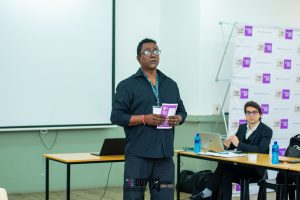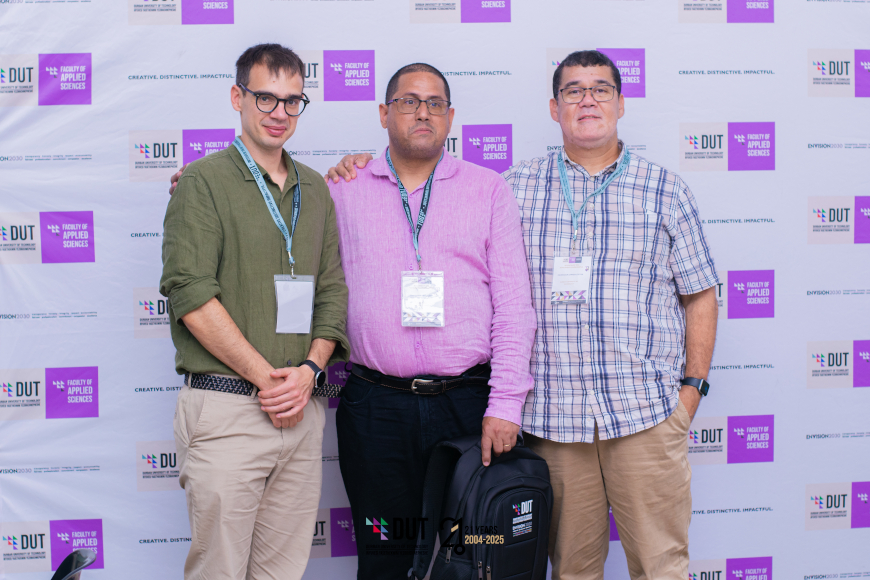The Mathematics department at the Durban University of Technology (DUT) hosted a one day Math Workshop on Nonlinear Phenomena. The first workshop of its kind which brought together seasoned academics, emerging researchers, postgraduate students in mathematics and theoretical physics, took place at the Rendezvous restaurant, based at the Steve Biko campus on 12 November 2025.
Giving the official welcome was Professor Darren Lortan, Head of Mathematics at DUT who welcomed all attendees to the first-ever Maths Workshop with great warmth explaining that the conference aim to highlight and celebrate the achievements and academic work of mathematicians.
Sharing his sentiments was Executive Dean: Professor Suren Singh who spoke on the field of nonlinear phenomena, saying that such a study requires interdisciplinary academic fields in the field of physics and mathematics and he was looking forward to the presentation of thought-provoking research being undertaken.
Giving an overview of research and impact within the Gravity Group at DUT was Prof Andronikos Paliathanasis. He explained why research in gravity was so important, indicating that the phenomena of the celestial sphere have constituted and continue to constitute one of the greatest mysteries of physical science. “Our contribution in the subject of gravity is not on the understanding of the fundamental physics but to also to contribute to the advancement of science, technology, and human knowledge; this is in alignment with DUT’s ENVISION2030 to promote transformative knowledge and production,” he emphasised.
Sharing more on projects such as the Square Kilometre Array (SKA) project. He explained that it is scheduled to begin operations in 2028–2029 in South Africa. “Its unprecedented sensitivity will provide new insights into the large-scale structure of the Universe, enabling new tests of gravitational theories and deeper exploration of the nature of dark energy. Therefore, being based in South Africa offers a unique opportunity to conduct pioneering research in gravity and deepen our understanding of cosmic evolution and actively contributing to Africa’s leadership in the global scientific arena,” added Prof Paliathanasis.
In terms of the continuation of the research, Prof Paliathanasis shared that there is a vital need to establish strong national and international collaborations, creating a network of researchers to advance the field (e.g. COSMOVERSE).
“To position DUT as a national hub for Gravity Research in South Africa, leveraging the NITheCS network to strengthen research capacity, collaboration, and global visibility. Promote research excellence and visibility through high-impact publications, hosting and participating in international meetings; and to encourage early career researchers to apply for international and national fellowships and to be hosted by DUT,” he expressed.
Following Prof Paliathanasis’ analytical presentation was DUT’s Dr Byron Brassels who spoke on the dark equation of state for the Gauss-Bonnet universe. Dr Robert Bogadi from DUT, shared his analysis of the curvature and structure scalars in General Relativity. He defined what is the meaning of General Relativity which is the current theory of gravity, explaining why there is a vital need to be interested in gravity referring to the observations of black hole shadows and the existence of a supermassive black hole at the centre of the Milky Way.
DUT’s Dr Sifiso Ngubelanga (DUT) delivered his presentation on: Relativistic stars and an equation of state, stating that the objective being is to present new classes of exact solutions to the Einstein filed equations for spherically symmetric spacetimes for matter distributions with anisotropic pressures in isotropic coordinates by imposing a cubic EoS.
The development of the RCUSP model for the purpose of improving the curriculum evaluation was DUT’s Dr Godfrey Mazibuko. He expressed that the objective is for the model to be applicable across various fields of study, however he shared that if a curriculum is found to be ineffective in developing students’ Higher Order Thinking Skills (HOTS), the model does not suggest abandoning it but it rather recommends further investigation.
Delving further into the topic of nonlinear phenomena, international presenter, Prof Genly Leon who is from the Universidad Austral de Chile, highlighted on his presentation titled: Averaged Scalar Field Anisotropic Cosmologies which looked at averaging LRS Bianchi III Einstein-Klein-Gordon system which uses the theory of averaging nonlinear dynamical systems to analyse the late-time behaviour of an expanding, anisotropic universe with a scalar field.
Dr Chevarra Hansraj from Stellenbosch University mesmerised attendees with her take on unravelling the geometry of the rotating black hole. Dr Sudan Hansraj (UKZN) showcased his talk on equations off (G, B) gravity as an autonomous system. Whilst Prof Keshlan Govinder (UKZN) whet attendees appetites with his riveting talk on Applications of Asymptotic analysis to radiating stars.
 After a robust day of amazing cutting edge topics in math and physics, the day culminated with Prof Megandhren Govender’s discussion on nonlinear phenomena related to mathematics, applied mathematics and physics. While we observe a large degree of symmetry in our Universe, from the beautiful structures in flowers, through to a myriad of colours in insects and animals, our Cosmos is governed by a tapestry of nonlinear phenomena embedded in the behaviour of fluids, structure formation, heat transfer, climate change, to mention a few.
After a robust day of amazing cutting edge topics in math and physics, the day culminated with Prof Megandhren Govender’s discussion on nonlinear phenomena related to mathematics, applied mathematics and physics. While we observe a large degree of symmetry in our Universe, from the beautiful structures in flowers, through to a myriad of colours in insects and animals, our Cosmos is governed by a tapestry of nonlinear phenomena embedded in the behaviour of fluids, structure formation, heat transfer, climate change, to mention a few.
Prof Govender also added that workshops of this nature help bring researchers out of isolation, creating a fluid space where collaborations are built and creative ideas are spawned.
Pictured: Prof Andronikos Paliathanasis, Prof Genly Leon (Universidad Austral de Chile), and Professor Darren Lortan, at the Math Workshop on Nonlinear Phenomena.
Photography: Nompumelelo Mpungose
Waheeda Peters

